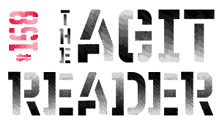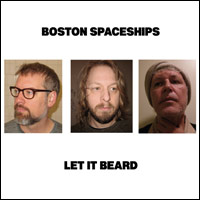
Let It Beard
GBV, Inc.
The first thing that hits you as you approach Let It Beard, the fifth album from Robert Pollard’s Boston Spaceships, is the sheer mass of the album. The 26-track, 75-minute double-LP is demanding and a lot to digest. Conceived by Pollard as what he calls “a subconscious concept album about the sorry state of rock & roll,” Let It Beard was initially recorded in Portland by Chris Slusarenko (the onetime GBV bassist and a frequent Pollard collaborator) and drummer John Moen (most famously of the Decemberists) before the tapes were shipped to Ohio for Pollard’s vocals. But despite its long-distance origins and hefty runtime, the album has a distinctly cohesive feel. It’s not that the songs on Let It Beard sound similar—they’re actually all over the rock & roll roadmap—but that they seem to be conceived as part of a unified vision, lending credence to Pollard’s conceptual claim. Album opener “Blind 20-20” serves as a perfect example. It starts off with some pure noise, blasts open as a tense, atonal rocker, transitions into an acoustic pop ballad, makes a left turn for some electric guitar riffs and then ends with more acoustic pop—all in the span of three minutes. There’s obviously a lot going on, but it all fits together seamlessly. The majority of the remainder of the album is a bit more deliberate, with the band choosing to draw out the album’s dialectics a few songs at a time rather than all at once.
There’s a lot of standard, but good, Pollard rockers and pop songs on Let It Beard, and the quality is remarkably consistent. Pollard’s on the record as saying that Boston Spaceships is his main band—in other words, not a side project—and it shows on this carefully constructed album. Everything Pollard does will fall under the considerable shadow of his classic-era Guided By Voices records, but Let It Beard will stand as a rewarding listen for years to come.
Ron Wadlinger
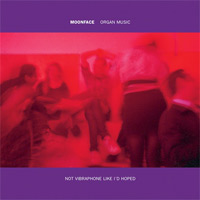
Organ Music Not Vibraphone Like I’d Hoped
Jagjaguwar
As if being a member of two fairly successful bands (Wolf Parade and Sunset Rubdown) wasn’t enough to keep him busy already, Spencer Krug has now released his full-length debut as Moonface, his new solo project. Krug’s described making the record as a way to keep busy during the harsh Montreal winter (he makes it sound like he was barely able to leave the house) and that he originally had the intention of creating a “long, drone-filled, lush and noisy album of intense volume and beauty and poeticism” on double-manual organ before his pop instincts got the better of him.
As it turns out, Organ Music Not Vibraphone Like I’d Hoped is an insular record that delves headlong into Krug’s affinity for the double-manual organ (you know, the kind with all the colorful buttons common in the front rooms of old spinsters). It also demonstrates a wordiness reflected by the titles of the songs as well as the album itself. With only five songs, each stretched out to at least six minutes, that breadth is also manifested in the music as well. Unfortunately, there are few—if any—instances where Krug is able to capture one’s attention for the entirety of a track. “Fast Peter,” Organ Music’s centerpiece both literally and figuratively, is a poignant bittersweet pop song for its first four minutes before it digresses down a wormhole of droning Sunday school tones. The juxtaposition of the instrumentation and Krug’s goth-tainted, achy-breaky vocals makes for an interesting listen for the first five minutes or so of “Whale Song (Song Instead of a Kiss),” but he fails to find a lyrical or musical hook before the track drags on for another three minutes. “Shit-Hawk in the Snow” is perhaps the only success, its icy veneer recalling the Silver Apples in the song’s best moments. But for the most part, Krug has made an album only a mother—or more aptly, one of those old spinsters—could love.
Stephen Slaybaugh
MP3: “Fast Peter”
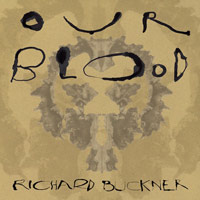
Our Blood
Merge
Richard Buckner believes in the long form. Since his first appearance in the mid-90s to his most recent Merge Records release, Our Blood, he has made it a point to force his listeners to walk over coals in order to call themselves true fans. Outside of 2000’s excellent and possible career peak The Hill, Buckner’s releases have teetered on being ridiculously melodramatic and at times tiring.
This batch of melodrama, his first release since 2006, is perhaps his most grotesquely yawn-inducing yet. Lyrically, Buckner’s rhymes are elementary and his voice, which can be ghostly and hypnotic at times, sounds trite and irritating here. Perhaps even more frustrating is the music that’s backing him. He uses so much Wurlitzer (which I can guarantee isn’t a real wurly but instead an electric organ with a million sounds logged into it) you’d think he would have something more exciting to do with it. Each piano part is so excruciatingly sparse it makes you think that he invited a 12-year-old to join him in the studio.
In all honesty, it wouldn’t be that all that bad if Buckner didn’t take himself so seriously. He attempts to make every word a life or death situation, which erases any kind of meaningful wordplay. His best effort on Our Blood is the very first offering, “Traitor”, which actually has a reasonable hook and a decent pacing that doesn’t make you feel as though you’re staring into the soul of an AM radio. The album rolls steadily downhill from there, though, and in the end all you’re left with is a hankering for a night of nothing but listening to the Radar Brothers, who do exactly what Richard Buckner is trying to do, but with more emotion and more consistent playability.
Terrence Adams
MP3: “Traitor”
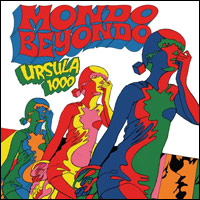
Mondo Beyondo
ESL
There’s a fine line between embracing your influences and being dominated by them, and it’s rare that you can hear an artist’s roots, but also see them turned on their end. So raise a toast to the unapologetically eclectic Ursula 1000. The DJ/producer, known to the government as Alex Gimemo, has combined bossa nova, lounge kitsch, breakbeats and a crockpot full of other sounds into his 007-referencing Ursula 1000 project.
Gimeno walks a fine line. It’s hard to imagine anyone squeezing more mileage out of the lounge movement. Even mentioning the niche brings up too many images of guys trying hard to recreate Swingers and far too many overly earnest, but musically vacant, Esquivel tributes. Instead, Mondo Beyondo cranks up the fun factor and doesn’t really try too much to be authentic. Besides, anybody who ropes in the B-52s’ Fred Schneider for a turn on the mic has to have partying on his mind. The result is an exhilarating romp through Gimeno’s head. Think the Avalanches, crossed with Deee-Lite with a pinch of Propellerheads and that’s almost it.
You can trainspot Gimeno until the break of morning, but he’s not afraid to throw in some curveballs. Just when you’re positive that non-stop frugging is on the agenda, Mondo Beyondo takes a hard left. There’s the Prince meets Baltimore club music collision of “Baby Laser Love,” the icy stomp of “(You Can’t Control) The Spectrum Soul,” which is like Joy Division as revived by Moby, and “Graveyard Stomp,” which seems like an alternate outro to The Munsters. The distance that Ursula 1000 covers in a relatively brisk 48 minutes is nothing less than remarkable.
Dorian S. Ham
MP3: “Répétez Le Repetoire”
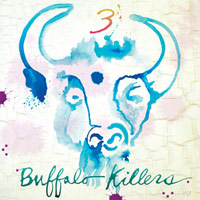
3
Alive
As the Buffalo Killers have progressed over the course of their career, the Cincinnati band has turned down with each successive release. It’s tempting to fall back on tired cliches and say that they’ve mellowed with age, but as they fell prey to the sophomore slump with 2008’s Let It Ride, it’s probably more accurate that they’ve slowly begun playing to their strengths. Further evidence is the band’s efficiently titled third album, 3, whose lighter complexion suits the trio well.
Though 3 starts off unpromising with “Huma Bird,” the kind of country-fried refurbishing that never did the band any good in the past, a couple songs later with “Mountain Sally,” the band begins to hit its stride. Traded vocals and pastoral guitar motifs are gilded with Youngian flecks. As the record becomes more subdued with each subsequent track, the Killers interaction becomes increasingly intricate and nuanced. “Lily of the Valley” could just as well be the Left Banke, its dewey pop melody highlighted by pedal steel and flute touches. “All Turn to Cloud” is more Southern in its accents, but favors a similarly gossamer disposition. The record eventually ends on an appropriately drowsy note with “Could Never Be,” the band seemingly sliding off into the ether. It’s taken awhile for the Buffalo Killers to find their softer side, but they are better men for it.
Stephen Slaybaugh
MP3: “Circle Day”
ALBUM REVIEWS
Wu-Tang, Legendary Weapons
Fruit Bats, Tripper
Machinedrum, Room(s)
Widowspeak, Widowspeak
Sole and the Skyrider Band, Hello Cruel World
They Might Be Giants, Join Us
Tomorrow's Tulips, Eternally Teenage
Metronomy, The English Riviera
Thievery Corporation, Culture of Fear
Zomby, Dedication
Part Time, What Would You Say
The Fruit Tree Foundation, First Edition
Sons and Daughters, Mirror Mirror
Eleanor Friedberger, Last Summer
